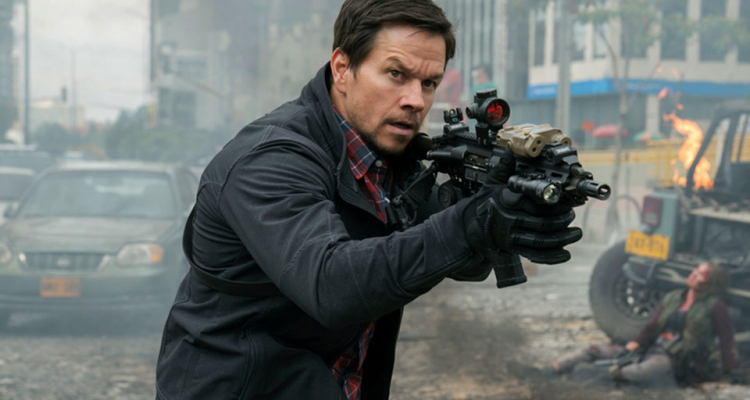Much has been written – and will continue to be written – about the problematic politics and jingoism of director Peter Berg’s recent output. It will be written by much more accomplished, more intelligent, and more informed, full-time journalists than this part-time tourist. But not enough will be written about how “Mile 22” — on its own merits — is a laughably bad film.
The screenplay — written by Lea Carpenter with a story from Carpenter and Stephen Levinson — might as well be Mark Wahlberg fan fiction. He plays James Silva, who we learn in the opening credits — in a fashion not unlike a superhero origin story — is special and that his brain functions at a higher capacity than most people. This gift allows him to speak at twice the speed like an Aaron Sorkin script, but muse on about governmental conspiracies and corruption in the film’s courtroom-style framing device with all the subtlety and depth of a Neil Breen film. His fast-talking and feeble attempt at quips make Deadpool seem like a pleasant person to hang out with.
Silva is the top CIA operative in a group called “The Overwatch” (not to be confused with Blizzard’s popular video game), which in this case is essentially a low-rent IMF (which could stand for “Imbecile Mother Fucker,” since every other word in this script is an insult, an expletive, or a combination of the two). This group has two teams, one on the ground, and the eyes in the sky over 1,000 miles away calling the shot (and no explanation is given as to why, but we can assume it’s so they could shoot all of the scenes with John Malkovich — who is calling the shots — in one day).
Anyway, a lot of shooting happens at a Russian safe house at the beginning of the film, they retrieve some hard drives with sensitive data, and something in the mission goes wrong, and The Overwatch is on thin ice. You know, that old chestnut. Then there’s what we think is a B-plot with Alice (Lauren Cohen) and her parental app installed on her phone by her ex-husband and lawyers (so we’re told) that shuts down when she uses vulgar language in front of her child. This is a real thing that happens. It sounds insane, but surely there’s a payoff to it in some way, right? No, they pretty much drop it and it’s never mentioned again.
Moving on.
Iko Uwais from “The Raid” films shows up as Li Noor, Alice’s contact who tipped her off about their “raid” (I’ll see myself out) on the Russian safe house. He has the encryption key for the hard drives and offers to give the key in exchange for an escort out of the country. They give in to the demands but are ambushed during the 22-mile trek to the airport, and the team has to fight their way out.
In an age where the “John Wick” films and the last three “Mission: Impossible” films have become incredibly popular, it feels like action films are returning to an era of long takes, comprehensible editing, and geographical clarity when it comes to staging set pieces. The Michael Bay-MTV-A.D.D era of action movie filmmaking almost feels like a distant memory. But other than Bay himself, we have Berg, desperately clinging on the last breath of shaky-cam close-ups and disorienting, indecipherable editing. Disorienting can be fine. Quick cuts are even okay. But even a film like “Mad Max: Fury Road” or the aforementioned “Raid” films have a very clear method to the madness. You can follow the action even as it’s been flashed by quickly. Here, the camera is just flailing around the action scenes hoping to bludgeon you into thinking that this action is edgy or intense. And it isn’t just in the action scenes, either. The dialogue scenes have an insane amount of quick-cutting and lack-of-clarity, not to mention consistent, infuriating disregard of the 180-degree rule, to the point where you wonder if Berg — who has made his fair share of decent films — even knows what that is. It’s that blatant.
There are literally two aspects that keep this movie from an “F” grade. The most important one is that the credits roll at minute 85. It still feels like an eternity, but it’s short. The other is Uwais, who anchors the film’s only credible action sequence in a military hospital between him and two undercover spies. Berg lets Uwais let loose with his pencak silat-style martial arts and films the scene to fit Uwais’ style, instead of the other way around. While it may only be a small appetizer compared to the full-course meal of the two “Raid” films, it makes this film come to life for a moment, however brief.
“Mile 22” is so misguided in every other single facet of filmmaking that it feels like Yoram Globus and the ghost of Menahem Golan somehow possessed this production. If it didn’t have such a hateful self-seriousness to it, it would be a contemporary Cannon film. The violence is insanely grisly and over-the-top, and the film has no morals or lessons to be learned. All of this could be ripe for prime B-movie enjoyment, but the tone and the insistence that it actually has its finger on the pulse of society and is saying something important is just depressing.
Towards the end, Li looks back and Silva and says, “Say hi to your mother for me.” You assume that they’re referencing the famous SNL sketch about Wahlberg, but then you slowly realize that line actually factors into the asinine plot. This single moment of seemingly tongue-in-cheek levity and they managed to screw that up too. There isn’t possibly a better metaphor than that to describe “Mile 22.” [D-]

